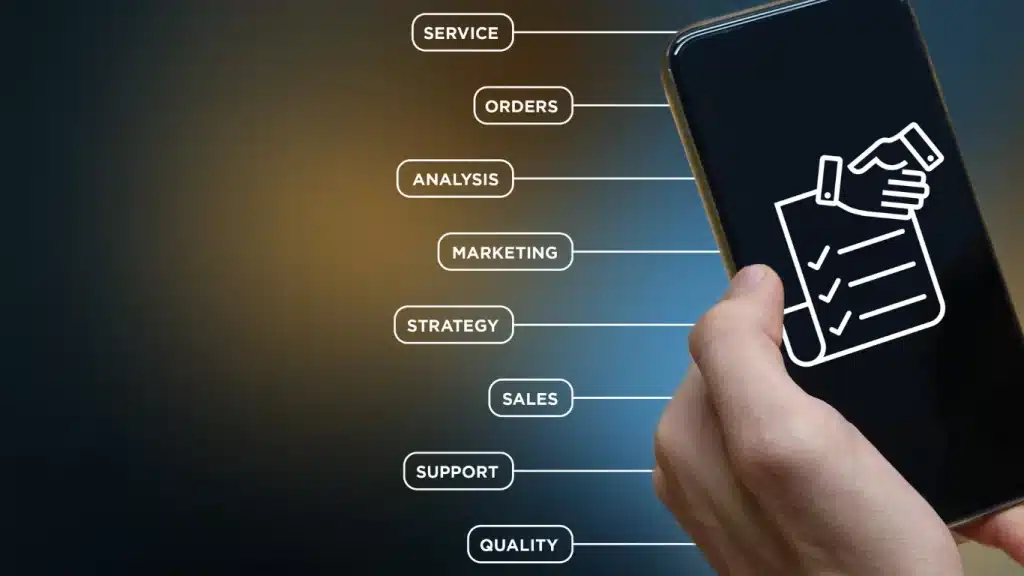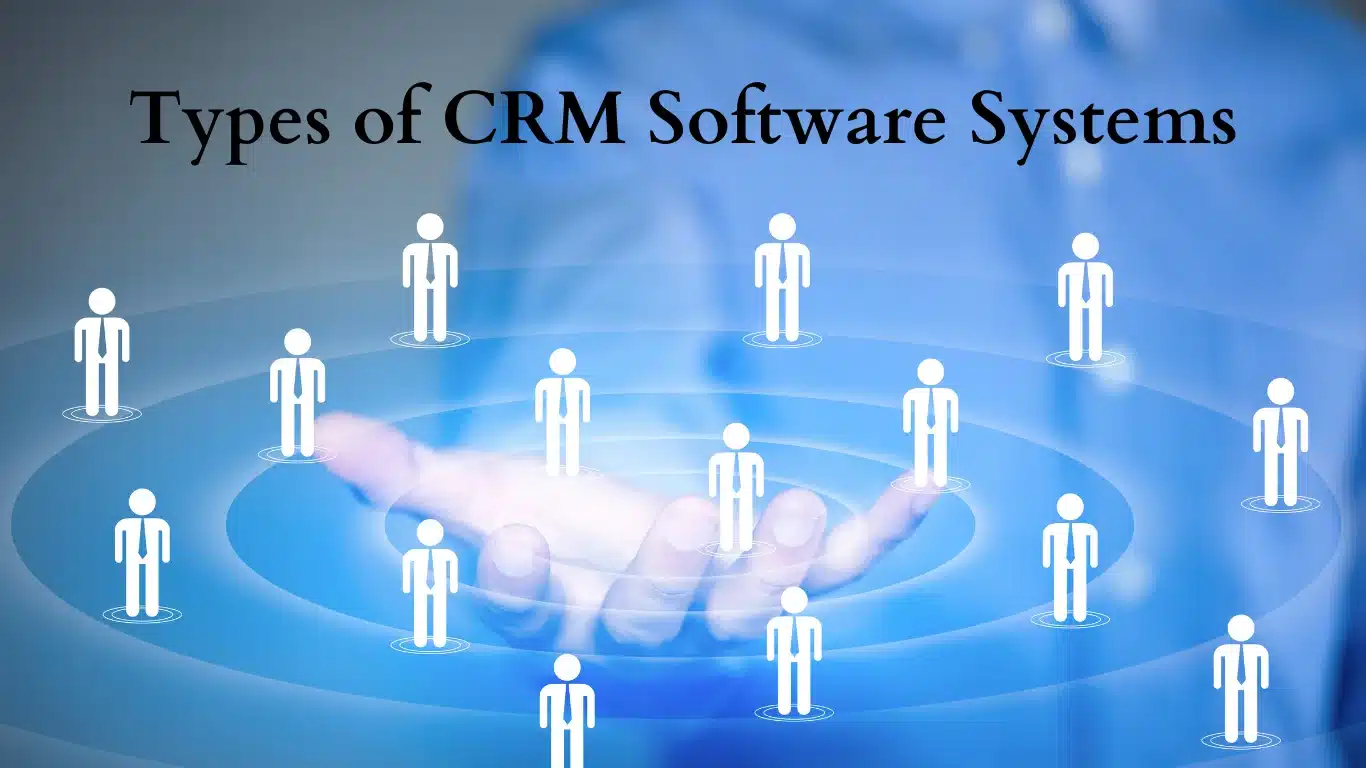Customer Relationship Management (CRM) software has become a valuable tool for businesses of all sizes. In today’s market, it is crucial to manage relationships with customers, prospects, and partners effectively. CRM software provides a systematic approach to tracking and analysing customer interactions, ensuring a personalized and seamless experience.
What are the types of CRM software available?
There are many different types of CRM software systems available, each catering to specific business requirements.

On-premise CRM software
On-premise CRM software is installed and operated on your company’s servers. This type of CRM software offers complete control over data and customization options. It is ideal for businesses with strict security requirements or those that prefer to have their data stored locally. On-premise CRM software may require a higher upfront investment for hardware and infrastructure.
Cloud-based CRM software
Cloud-based CRM software, or Software-as-a-Service (SaaS) CRM, is hosted on the provider’s servers and accessed via the Internet. This type of CRM software offers flexible scalability, as you can add or remove users as your business grows. Cloud-based CRM software is cost-effective, eliminating the need for hardware and infrastructure investments. It also allows remote access, enabling your team to work from anywhere.
Open-source CRM software
Open-source CRM software provides the freedom to customize the software’s source code according to your specific needs. Offering flexibility and scalability, allowing you to modify the software as your business evolves. Open-source CRM software is ideal for organizations with unique requirements or those who prefer complete control over their CRM system. It may, however, require technical expertise to install and maintain.
Industry-specific CRM software
Industry-specific CRM software is tailored to meet the unique needs of specific industries. It includes pre-built features and functionalities relevant to the industry, such as real estate, healthcare, or finance. Industry-specific CRM software streamlines processes and provides industry-specific analytics, enabling businesses to deliver a more personalized experience to their customers.
Mobile CRM software
Mobile CRM software allows users to access CRM data and complete tasks on their mobile devices. It provides flexibility and enables sales representatives to access customer information on the go, improving productivity and responsiveness. Mobile CRM software is essential for businesses with a mobile workforce or those prioritising real-time data access.
Implementing and Integrating CRM software
Integrating CRM software requires thorough planning and execution for optimal results.

Assess your business requirements
Before implementing CRM software, it is essential to assess your business requirements. Identify the key features you need, such as contact management, lead tracking, or reporting. Consider your business goals, budget, and resources to determine the best CRM software solution for your organization.
Plan for data migration
Data migration is an essential stage in CRM software implementation. Ensure your existing data is clean, accurate, and organised adequately before migrating it to the new system. Define a data migration strategy, including mapping fields and establishing data ownership. Test the migration process thoroughly to avoid any data loss or inconsistencies.
Train your team
Proper training is crucial to ensure the successful adoption of CRM software. Train your team on how to use the CRM system effectively, including data entry, reporting, and workflow automation. Provide ongoing support and encourage feedback to address any challenges or concerns.
Integrate with existing systems
Integrating CRM software with your existing systems, such as email marketing or accounting software, can streamline processes and improve efficiency. Identify the integration points and evaluate the compatibility of different systems. Work closely with your IT team or CRM provider to ensure a seamless integration that meets your business requirements.
Popular CRM software systems
There are numerous CRM software systems available in the market, each with unique features. Here are some popular choices:
Salesforce
Salesforce is a popular CRM software system worldwide, with numerous capabilities such as contact management, opportunity tracking, and sales forecasting. It provides a highly customizable platform and integrates with various third-party applications.
Microsoft Dynamics 365
Microsoft Dynamics 365 is a comprehensive CRM system that works with other Microsoft applications such as Outlook and Excel. It offers robust sales, marketing, and customer service functionalities, along with advanced analytics capabilities.
Zoho CRM
Zoho CRM is a cloud-based CRM software that caters to businesses of all sizes. It has a user-friendly interface, as well as capabilities for lead management, email marketing, and social media integration. Zoho CRM also delivers iOS and Android mobile apps.
HubSpot CRM
HubSpot CRM is a free CRM software with a user-friendly interface and basic CRM functionalities, such as contact management and email tracking. It seamlessly integrates with other HubSpot products, such as marketing automation and customer service.
FAQ
What are the 4 types of CRM?
CRM software can be categorized into four main types: operational CRM, analytical CRM, collaborative CRM, and strategic CRM. Each type serves a different purpose and focuses on specific aspects of customer relationship management.
- Operational CRM: This type of CRM software is designed to automate and streamline business processes, primarily in sales, marketing, and customer service departments. It helps businesses track customer interactions, sales leads, and customer support tickets.
- Analytical CRM: Analytical CRM software helps businesses analyze and interpret customer data to gain valuable insights. It enables companies to make data-driven decisions by providing reports, dashboards, and data visualization tools.
- Collaborative CRM: Collaborative CRM software focuses on improving communication and collaboration among different departments within a company. It allows employees from various teams, such as sales, marketing, and customer service, to share customer information, collaborate on projects, and coordinate their efforts.
- Strategic CRM: Strategic CRM software is meant to help businesses develop and implement long-term strategies to maximize customer satisfaction and loyalty.
What are the 3 types of CRM systems?

On-premise CRM, cloud-based CRM, and mobile CRM. Each class offers different deployment options and benefits, catering to the diverse needs of businesses.
What are the 3 main modules of CRM?
CRM software typically consists of multiple modules that work together to provide a comprehensive solution for customer relationship management. The three main modules of CRM are contact management, sales automation, and customer service.
Conclusion
Choosing the best types of CRM software for your company is an important decision that may have a significant impact on your customer interactions and overall business success. Understanding the many types of CRM software available allows you to make an informed decision that meets your needs and goals. Whether you opt for on-premise, cloud-based, open-source, or industry-specific CRM software, the key is to implement and integrate it effectively to maximize its benefits. Evaluate popular types of CRM software and consider their features, scalability, and integration capabilities before deciding. With the right CRM software, you can enhance customer satisfaction, improve sales efficiency, and drive business growth.





